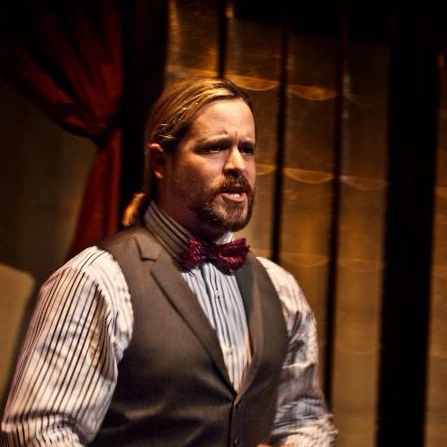 myCSUSM
myCSUSMwilliamgrazierinterview_april14

William Grazier as Rosencrantz in OnStage Playhouse's 2013 production of Tom Stoppard's Rosencrantz and Guildenstern are Dead.
This is my second semester at GEW as a lecturer. Prior to the Fall 2013 semester I spent a year teaching GEW 101 as a graduate student. In addition to my Masters degree, I have 10 years experience in electromechanical design and technical illustration, 5 years experience in technical sales for a company that sold custom optics for automated assembly systems, and I served four years with the US Navy as a submarine periscope repairman (optics technician).
I have always wanted to be a teacher. As an Eagle Scout, I conducted a lot of training, and during my military service, I was responsible for creating and administering job specific training; I've always felt comfortable speaking in front of a group, and I really enjoy imparting knowledge to those around me, whether or not they want it. I was motivated to earn my Masters degree after spending some time as a volunteer at and observing high school classrooms. I found that bureaucracy and seemingly arbitrary standards limited what educators could do in their classroom. The ramifications of the No Child Left Behind act seemed to be poorer education for all, rather than better education for a few. It was really disheartening to see. However, once I found out I could teach at the community college and four-year university level with a Masters degree, I shifted my focus toward earning a graduate degree.
I currently teach GEW 101 at CSUSM, exclusively. When I'm not at San Marcos, I work as a technical writer for General Atomics in Poway. I graduated from CSUSM with a Masters in Literature and Writing studies back in 2010. I have been working on getting a teaching position since graduating. I started working at General Atomics when I was unable to get an adjunct faculty position after graduation. I'm currently the lead writer for one of General Atomics' unmanned aircraft systems, which means I'm responsible for writing and updating flight manuals used by aircrews. I have found that my experience as a technical writer has made me a better instructor because I have become better at deconstructing the writing process and have practical, real-world examples I can share with my students. Additionally, my experience in the GEW program has made me a better writer, professionally. I have taken my classroom experience to the office, authoring a department style guide for other writers in my department as well as working on standards and practices for other technical writers to follow. In other words, the things I tell my students I look for in their assignments became the backbone of the style guide.
I really enjoy teaching, especially because it is an iterative process. Since I'm relatively new to the vocation, I'm always finding new ways to improve my instruction. I enjoy finding new ways to present the material to keep the subject fresh for myself, which I think the students can see in my presentation. Also, I learn something new from the students in each course. Their response to the material tells me what works, what doesn't, and highlights topics that I may be overlooking.
I can't say that I have a particularly horrifying experience, yet, but I tend to over prepare. Just ask my students. I generally show up to class with four pages of notes for each lecture. While I prefer to emphasize group learning, I've shifted the last couple of semesters to a more traditional teacher/student dynamic where I lecture and then ask students to demonstrate they have understood the lecture and can apply the knowledge in the form of a writing assignment. I find this approach seems to be more effective when focusing on building hard composition skills over soft literature criticism skills.
Despite shifting my focus from literary analysis, I still have favorite themes I like to focus on during the semester, namely the issue of identity. I was fascinated by identity, subjective identity vs. objective identity, performative identity, identity and cognition, etc., while working on my Masters degree. I've brought that to the classroom and have asked the students to address the issue of their digital identity, dual consciousness. (i.e., physical identity vs. digital identity), displaced consciousness, and so on. Heady stuff, for sure, but I find that a majority of the students rise to the challenge so long as the instructor is patient and walks the students through the discovery process.






